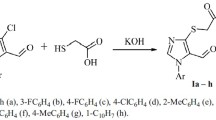Abstract
Pretreatment of male Wistar rats with L-ascorbic acid results in a decrease in thein vivo covalent binding of benzo(a)pyrene to hepatic nuclear DNA.In vitro formation of this adduct is also found to be low in liver slices and in liver nuclei of pretreated rats. No inhibition of the adduct formation is, however, observed when benzo (a) pyrene and exogenous DNA are incubated with liver microsomes isolated from ascorbic acid treated rats.It appears that the presence of ascorbate in the cellular or subcellular environment is essential for its inhibitory action.
Similar content being viewed by others
References
Borgen, A., Darvey, H., Castagnoli, N., Crocker, T. T., Rasmussen, R. E., and Wang, I. Y. (1974)Med. Chem.,16, 502.
Burch, H. B. (1961)Ann. NY. Acad. Sci.,92, 268.
Edgar, J. A. (1974)Nature (London),248, 136.
Farber, J. L., Shinozuka, H., Serroni, A., and Farmer, R. (1974)Lab. Invest.,31, 465.
Gelboin, H.V. (1969)Cancer Res.,29, 1272.
Gelboin, H. V., Kinoshita, N, and Weibel, W. (1972)Fed. Proc.,31, 1298.
Huberman, E., Sachs, L., Yang, S. K. and Gelboin, H.V. (1976)Proc. Nat.Acad. Sci., U.S.A.,73, 607.
Jahn, C. L. and Litman, G. W. (1979)Biochemistry,18, 1442.
Jerina, D. M. and Daly, J. W. (1974)Science, 185, 573.
Kallistratos, G., and Fasske, E. (1980)CancerRes. Clin. Oncol.,97, 91.
Kapitulnik, J., Levin, N., Conney, A. H., Yagi, H. and Jerina, D. M. (1977)Nature (London),266, 378.
Schlegal, J. U., Pipkin, G. E., Nishimura, R. and Schultz, G. N. (1970)J. Urol.,103, 155.
Shah, G. M., and Bhattacharya, R. K. (1980)Indian J. Biochem. Biophys.,17, 96.
Shamberger, R. J. (1972)J. Nat. Cancer Inst.,48, 1491.
Sims, P. and Grover, P. L. (1974)Adv. Cancer Res.,20, 165.
Sims, P., Grover, P. L., Swaisland, A., Pal, K. and Hewer, A. (1974)Nature (London),252, 326.
Slaga, T. J. and Bracken, W. M. (1977)Cancer Res.,37, 1631.
Stitch, H. F., Karim, J., Koropatnick, J. and Lo, L. (1976)Nature (London),260, 722.
Yamafuji, K., Nakamura, Y., Omura, H., Soeda, T. and Gyotoku, K. (1971)Z. Krebsforsch.,76, 1.
Yang, S. K., McCourt, D. W., Roller, P. P. and Gelboin, H. V. (1976)Proc. Nat. Acad. Sci. USA,73, 2594.
Author information
Authors and Affiliations
Rights and permissions
About this article
Cite this article
Shah, G.M., Bhattacharya, R.K. In vivo effect of L-ascorbic acid on benzo(α)pyrene metabolite-DNA adduct formation in rat liver. J. Biosci. 4, 263–268 (1982). https://doi.org/10.1007/BF02702737
Received:
Revised:
Published:
Issue Date:
DOI: https://doi.org/10.1007/BF02702737



